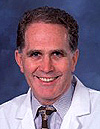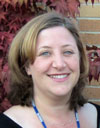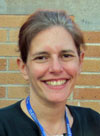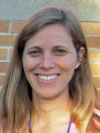|
Winter Quarter 2014
|
||||||||||||||||||||||||||||||||||||||||||||||||||||||
Tuesday, February 18th
This tour will be held at the VA Palo Alto Health Care System campus in the Spinal Cord Injury Service. The class will convene in Building 7, Room E111 at 4:30pm. Due to space limitations, it is open to enrolled students only. Abstract: Breaking your neck can affect nearly every part of your life. Physically, you may be paralyzed from the neck down, with no feeling in the body, unable to control your bladder or bowel or sexual function. Obviously, this affects you emotionally and socially - your education, work, house, travel, and relationships. What can assistive technology do to change this? The industrial revolution gave us new tools, special beds, mattresses, wheelchairs and cushions, catheters, implants, and many other gadgets. The microelectronic industry has revolutionized communication and control of equipment in the environment; if you can control a computer, you can control many other things. What about controlling paralyzed muscles? What about curing paralysis? Biosketch: Graham Creasey, formerly the Chief of the Spinal Cord Injury Service at the VA Palo Alto Health Care System, serves now as Staff Physician at VAPAHCS. He is also the Paralyzed Veterans of America Professor of Spinal Cord Injury Medicine at Stanford University. He attended the University of Edinburgh Medical School in Scotland and completed specialty and sub-specialty training and accreditation in Surgery and Spinal Injuries at the Royal College of Surgeons of Edinburgh. Along with his clinical role, he has been actively engaged in research, mainly on the restoration of bladder, bowel and sexual function using electrical stimulation. Dr. Creasey is also dedicated to training junior physicians and retaining outstanding young physicians in the VA Spinal Cord Injury System of Care.
Abstract: The Assistive Technology (AT) Center serves veterans with brain injury, polytrauma, ALS, and other conditions. Featured products will include Augmentative and Alternative Communication (AAC) Aids, alternative computer access devices, electronic cognitive aids, electronic aids for daily living, specialized seating & powered mobility, and adaptive sporting equipment. Biosketches: Karen Parecki is an Occupational Therapist who has worked at the Palo Alto VA since 1999. In that time, she has had experience working with veterans with long term care needs and those in acute inpatient rehabilitation, including specializing in working with patients with polytraumatic and head injuries for the past 10 years. Her primary areas of expertise in assistive technology are EADL/ECU, adaptive computer access, and electronic cognitive devices. She has been certified as an Assistive Technology Professional through RESNA since 2010. Eve Klein is a Speech Language Pathologist who has worked at the Palo Alto VA since 2000. She joined the Assistive Technology Center in 2010. She has extensive experience working with patients with neurogenic speech, language and cognitive disabilities, and voice disorders, in acute, outpatient, and rehabilitation settings. Her primary areas of expertise in assistive technology include augmentative and alternative communication and electronic cognitive devices. She has been certified as an Assistive Technology Professional through RESNA since 2010. Debbie Pitsch is a Physical Therapist who has worked at the Palo Alto VA since 1999 and joined the Assistive Technology Center team in 2010. She has over 15 years of experience working with veterans with neurological and orthopedic impairments including polytraumatic head injuries and amputation care in acute, outpatient, and rehabilitation settings. Her primary areas of expertise in assistive technology are adaptive sporting equipment, prosthetic training, and neuroprosthetic ambulation aids. She has been certified as an Assistive Technology Professional through RESNA since 2010.
|
||||||||||||||||||||||||||||||||||||||||||||||||||||||
|
||||||||||||||||||||||||||||||||||||||||||||||||||||||



